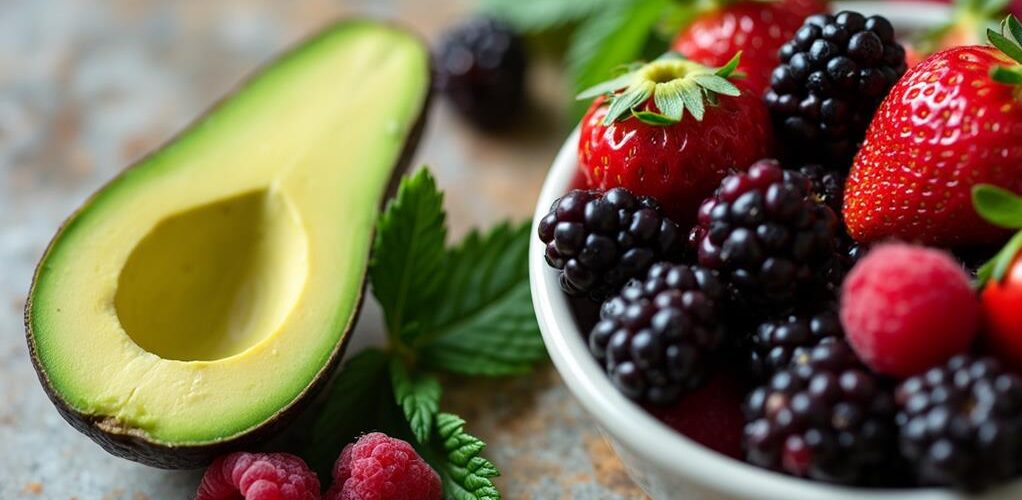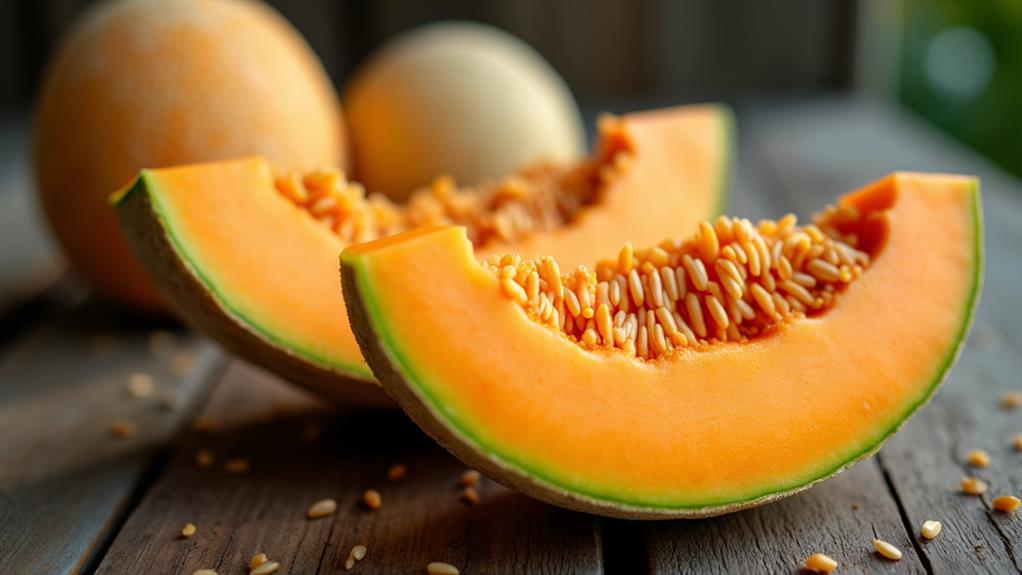
Discover the top seven keto-friendly fruits that can be great additions to your diet: avocados, strawberries, raspberries, lemons, tomatoes, blackberries, and cantaloupe. Avocados are packed with healthy fats and are very low in carbs, while berries such as raspberries and blackberries offer a high fiber content and antioxidants with minimal carbohydrate impact. Lemons provide vitamin C with only 4 grams of net carbs per fruit. Tomatoes and cantaloupe add variety and essential nutrients to your meals without compromising low-carb values. Each fruit offers unique benefits, and understanding their nutritional profiles can guide you in optimizing your keto diet.
Key Takeaways
- Avocados, with only 1.5 grams of net carbs, are rich in healthy fats and fiber.
- Strawberries offer 8.7 grams of net carbs per cup, packed with antioxidants and vitamin C.
- Raspberries have 2.6 grams of net carbs per 19 berries, rich in fiber and vitamin C.
- Lemons contain about 4 grams of net carbs and enhance flavor while boosting immune function.
- Blackberries provide 7 grams of net carbs per cup, high in fiber and vitamins C and K.
Avocados
Few foods can claim the versatility and nutritional benefits of avocados, making them a standout choice for those following a keto-friendly diet. With only 1.5 grams of net carbs per 100-gram serving, avocados align perfectly with the low-carb requirements of a ketogenic diet. Rich in healthy monounsaturated fats, they contribute to heart health and enhance satiety, helping individuals maintain their diet and avoid unnecessary snacking.
Additionally, avocados are rich in potassium (around 975 mg per medium fruit), which supports overall health by maintaining electrolyte balance. Their high fiber content, around 7 grams per serving, aids digestive health and assists in regulating blood sugar levels, offering additional health benefits to keto enthusiasts.
Avocados are not only low in carbohydrates but also a powerhouse of essential nutrients. They provide a substantial amount of vitamin K, folate, vitamin C, and potassium, which are vital for supporting bodily functions such as blood clotting, red blood cell formation, immune function, and maintaining electrolyte balance.
Incorporating avocados into meals can be both delicious and nutritious. Popular avocado recipes include creamy smoothies, flavorful salads, and savory spreads, showcasing their ability to enhance the taste and texture of various dishes. This makes avocados an indispensable ingredient in any keto diet plan, offering both culinary flexibility and health benefits.
Strawberries
Strawberries, with their vibrant color and sweet flavor, are a delightful addition to a keto-friendly diet. They contain approximately 11.7 grams of carbohydrates and 3 grams of fiber per 1-cup serving, resulting in about 8.7 grams of net carbs. This makes strawberries a suitable option for those maintaining a low-carb lifestyle.
Rich in vitamin C, strawberries provide about 149% of the daily value per cup, supporting immune function and skin health. Additionally, these berries are high in antioxidants, such as anthocyanins and ellagic acid, which are beneficial in reducing inflammation and lowering the risk of chronic diseases. A ketogenic diet is known to help in reducing pro-inflammatory cytokines, which may be an added advantage when incorporating strawberries into your meals.
Different strawberry varieties can be explored to diversify one's diet, each offering unique flavors and textures that can be incorporated into various strawberry recipes. From fresh salads and smoothies to keto-friendly desserts, strawberries can enhance heart health by improving cholesterol levels and promoting vascular function due to their polyphenolic compounds.
Furthermore, their low glycemic index aids in regulating blood sugar levels, making them particularly advantageous for individuals adhering to a ketogenic lifestyle. Consuming strawberries as part of a balanced diet can provide numerous health benefits while satisfying sweet cravings without compromising nutritional goals.
Raspberries
Raspberries are an exceptional choice for those adhering to a keto diet, with only 2.6 grams of net carbs per 19 berries, allowing for a low-carb fruit option that aligns with dietary goals.
Beyond their low-carb count, raspberries are high in dietary fiber, which can help stabilize insulin levels and reduce hunger by promoting feelings of fullness. This is vital for weight management strategies on a ketogenic diet.
Additionally, their high antioxidant content, including vitamin C and manganese, contributes to reducing inflammation and enhancing overall health, making raspberries not only a keto-friendly choice but also a nutritious one.
Nutritional Benefits
With their impressive nutritional profile, raspberries emerge as a keto-friendly fruit offering numerous health benefits. One significant advantage is their high fiber content, with 8 grams per cup, which aids digestion and enhances satiety. This fiber not only supports gastrointestinal health but also contributes to effective weight management, a fundamental aspect of a successful keto diet.
Additionally, the fiber in raspberries plays a role in maintaining stable blood sugar levels, a benefit particularly valuable for individuals monitoring their glucose intake.
Raspberries are a powerhouse of vitamin C, delivering approximately 54% of the daily value per cup. This essential nutrient is essential for supporting immune function and promoting skin health by facilitating collagen production and acting as an antioxidant.
Speaking of antioxidants, raspberries are abundant in compounds like ellagic acid and quercetin. These antioxidants are known for their ability to reduce inflammation and potentially lower the risk of chronic conditions such as heart disease and cancer.
Moreover, raspberries possess a low glycemic index, further supporting their role in a balanced diet by minimizing blood sugar spikes.
Therefore, incorporating raspberries into a keto regimen can be a strategic choice for enhancing overall health and wellness.
Low-Carb Content
Among various fruits, raspberries stand out with their low-carb content, containing approximately 7 grams of net carbs per cup (123 grams). This characteristic makes them an appealing choice for individuals adhering to a ketogenic diet.
When conducting carb comparisons, raspberries emerge as a superior option to fruits like bananas or grapes, which possess considerably higher carbohydrate content. For example, a medium banana contains about 24 grams of net carbs, highlighting the advantage of choosing raspberries as a fruit substitution.
Raspberries' low-carb profile is complemented by their rich dietary fiber content—8 grams per cup—which not only aids digestion but also enhances satiety, making it easier to maintain caloric control.
Moreover, their low glycemic index guarantees minimal impact on blood sugar levels, an essential factor for those managing diabetes or following keto guidelines.
Beyond their macronutrient profile, raspberries are a powerhouse of micronutrients. They offer approximately 54% of the daily recommended intake of vitamin C per cup, and their high antioxidant levels contribute to reducing inflammation and lowering the risk of chronic diseases.
Lemons
Lemons, a staple in the domain of keto-friendly fruits, are notable for their low carbohydrate content and nutritional benefits. Containing about 4 grams of net carbs per fruit, lemons offer a flavorful yet low-calorie option for those maintaining a ketogenic diet.
Lemon benefits extend beyond their macronutrient profile. Rich in vitamin C, lemons enhance immune function and aid in the absorption of iron from plant-based sources, essential for those on restrictive diets. Additionally, promoting digestive health is another advantage of lemons, as their high pectin content plays a role in stabilizing blood sugar levels and offering a synergistic approach to maintaining metabolic balance.
Incorporating lemons into your diet can be both delicious and health-enhancing. Lemon recipes are abundant, ranging from simple lemon water to more complex dishes that utilize lemon zest and juice, adding vibrancy and a healthful punch to meals.
Their low glycemic index guarantees minimal impact on blood sugar levels, making them an ideal ingredient in a variety of ketogenic meals. Additionally, with only about 17 calories per medium lemon, they provide a guilt-free way to enhance flavors without compromising dietary goals.
Consequently, lemons stand out as a versatile and beneficial fruit for keto enthusiasts.
Tomatoes

Tomatoes, a versatile fruit, are an excellent choice for those following a ketogenic diet due to their relatively low carbohydrate content, with approximately 4.78 grams per medium tomato. Beyond their macronutrient profile, tomatoes are rich in lycopene, an antioxidant known for its potential to reduce the risk of heart disease and certain cancers. Additionally, one medium tomato provides about 1.5 grams of fiber, supporting digestive health and contributing to overall fiber intake.
| Nutrient | Amount per Medium Tomato | Benefit |
|---|---|---|
| Carbohydrates | 4.78 grams | Low-carb for keto |
| Fiber | 1.5 grams | Supports digestion |
| Calories | 22 calories | Low-calorie option |
| Lycopene | High | Antioxidant properties |
Tomato varieties such as cherry, roma, and heirloom offer diverse culinary uses, making them suitable for a plethora of dishes, including salads, soups, and sauces. Their low-calorie content, approximately 22 calories per medium tomato, allows them to enhance meals without greatly impacting caloric intake. Moreover, tomatoes are a valuable source of vitamins A and C, essential for immune function and skin health. Incorporating tomatoes into a ketogenic diet not only enhances flavor but also provides considerable health benefits, making them a beneficial addition to any low-carb meal plan.
Blackberries
Blackberries are an excellent choice for those adhering to a keto diet, primarily due to their low net carbohydrate content of approximately 7 grams per cup, making them minimally impactful on blood sugar levels.
They offer significant nutritional benefits, including a high fiber content of around 7.6 grams per cup, which aids in digestive health and increases satiety.
Additionally, blackberries are rich in antioxidants, featuring vitamins C and K, which support immune function and help reduce inflammation.
These antioxidants are beneficial for cardiovascular health and may contribute to improved heart function.
This makes blackberries a nutrient-dense addition to a variety of meals.
Nutritional Benefits Overview
When considering keto-friendly fruits, it's worth delving into the nutritional benefits of blackberries, which stand out as a prime choice. One of the key attributes of blackberries is their impressive fiber content. With approximately 7.3 grams of dietary fiber per cup, they support digestive health and enhance feelings of fullness, essential for weight management. This high fiber content contributes to blackberries being a low-calorie, nutrient-dense option, making them ideal for those following a ketogenic diet.
In addition to fiber, blackberries are rich in antioxidant properties. They contain potent compounds like anthocyanins, which not only give the fruit its deep purple hue but also play a role in reducing inflammation. These antioxidants are associated with a lower risk of chronic diseases, including heart disease and certain cancers.
Additionally, blackberries provide essential vitamins and minerals; they offer about 24% of the daily recommended intake of vitamin C per cup, contributing to immune function, and contain vitamin K, important for bone health.
With a low glycemic index, blackberries can help maintain stable blood sugar levels, adding to their suitability for a keto diet focused on metabolic health.
Carb Content Analysis
Although fruits are generally known for their carbohydrate content, blackberries present an intriguing exception with their relatively low net carbs, making them particularly suitable for a ketogenic diet. A cup of blackberries contains approximately 13.8 grams of total carbohydrates, but due to their high fiber content of about 7.6 grams per cup, they only deliver around 5.3 grams of net carbs.
This notable fiber presence not only reduces their net carbohydrate impact but also supports digestive health and promotes satiety, essential factors for maintaining a successful keto journey.
When analyzing different blackberry varieties, it is evident that their carbohydrate profile remains consistent, allowing for diverse culinary applications. With a half-cup serving offering just 31 calories, blackberries are a low-calorie option that can be seamlessly integrated into keto recipes without disrupting macronutrient goals.
Their rich supply of vitamins C and K, along with manganese, further enhances their health benefits by supporting immune function and bone health.
Additionally, blackberries are abundant in antioxidants, particularly anthocyanins, which may aid in reducing inflammation and promoting overall well-being.
Consequently, incorporating blackberries into keto-friendly meals not only aligns with dietary guidelines but also enriches the nutritional profile of one's diet.
Cantaloupe

Incorporating cantaloupe into a keto diet can be a strategic choice due to its relatively low net carbohydrate content. With approximately 11.2 grams of net carbs per cup, cantaloupe can be consumed in moderation while adhering to the carbohydrate restrictions of a ketogenic lifestyle.
To maintain ketosis, it's important to distribute protein intake evenly across meals, which can be complemented by pairing cantaloupe with low-carb proteins such as prosciutto or cottage cheese. This creates a balanced dish that is both satisfying and compliant with keto guidelines.
Cantaloupe is not just about carbohydrate content; it also offers a rich nutrient profile. It is high in beta-carotene, which the body converts into vitamin A, essential for maintaining vision and supporting immune function. Additionally, cantaloupe provides vitamin C, an antioxidant that promotes skin health and immune support, along with potassium and folate, which are essential for cardiovascular health and cellular function, respectively.
The fruit's high water content, approximately 90%, can aid in hydration, important for keto dieters who may experience increased water loss.
Ultimately, cantaloupe can serve as a hydrating and nutrient-rich addition to a keto meal plan.
Frequently Asked Questions
What Are the Best Fruits for Keto Diet?
Keto fruit options emphasize low carb berries such as raspberries and blackberries, which are high in fiber and antioxidants. Avocado, rich in healthy fats, and lemons, beneficial for blood sugar stabilization, also complement a keto diet.
Can I Eat Fruit on Keto and Still Lose Weight?
Yes, you can consume keto fruit options and still lose weight by practicing fruit portion control. Selecting low-carb fruits like avocados or berries and monitoring total carbohydrate intake guarantees ketosis maintenance and supports weight management.
What Are the Top 10 Keto Foods?
The top 10 keto foods for effective keto meal prep and low carb snacks include avocados, fatty fish, eggs, nuts, seeds, cauliflower, cheese, olives, leafy greens, and coconut oil, all promoting ketosis while providing essential nutrients.
How Many Fruits a Day on Keto?
On a keto diet, it is advisable to consume 1-2 servings of keto fruit varieties daily. Prioritize low carb options like berries and avocados to maintain ketosis while ensuring essential nutrient intake without exceeding carbohydrate limits.
Conclusion
Incorporating keto-friendly fruits such as avocados, strawberries, raspberries, lemons, tomatoes, blackberries, and cantaloupe into a ketogenic diet can provide essential nutrients while maintaining low carbohydrate intake. These fruits offer beneficial vitamins, minerals, and antioxidants that support overall health without compromising the state of ketosis. Their low glycemic index and high fiber content further enhance their suitability for a ketogenic lifestyle. Consequently, including these fruits can aid in achieving dietary goals while promoting balanced nutrition and metabolic health.










No Comments